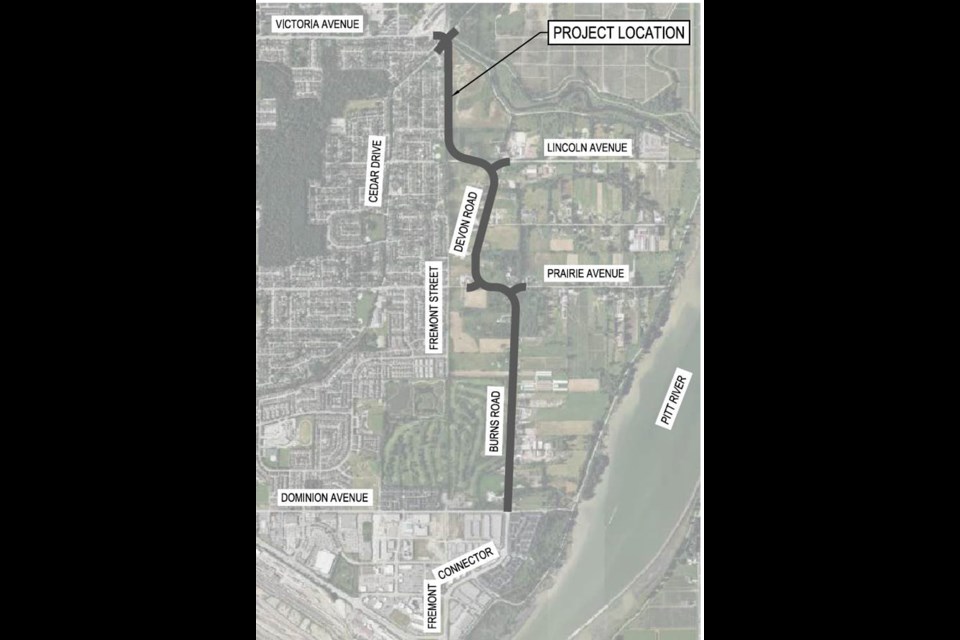This story was updated on Monday, Dec. 20, 2021.
Construction will start in two years on a road to get residents from Coquitlam’s Burke Mountain to the Mary Hill Pass and Lougheed Highway in Port Coquitlam.
The preliminary design for the long-awaited — and highly controversial — Fremont Connector is now finalized, with both cities signing off on the alignment.
The 4.7 km artery has been on the cities’ transportation books for decades and aims to ease the current traffic snarl-ups along the only two north-south routes from Burke Mountain: Coast Meridian Road and Cedar Drive.
According to a press release issued last Thursday, the connector will
- start from the east end of Victoria Drive in Coquitlam
- follow the existing Fremont Street road allowance to Lincoln Avenue in Coquitlam
- use the built Devon Road, Prairie Avenue and Burns Road in Port Coquitlam before linking up with the Mary Hill Bypass and Lougheed Highway
Port Coquitlam council voted on its portion of the connector in 2015, going against the recommendations of its own planning and engineering managers in deciding its route.
Then, in selecting the Devon Road alignment rather than cutting through agricultural land, PoCo councillors stressed that they wanted to make sure there was as little impact to the Sun Valley residents as possible — especially for those living on St. Thomas Street, west of the power lines.
On Monday (Dec. 20), PoCo Mayor Brad West defended council’s decision from seven years ago, when he was a city councillor. “The Port Coquitlam portion is still the same and I support it. The only thing new is that Coquitlam has finalized their side.”
But what’s also changed is the width of the connector, which is now down from four to two lanes.
Jaime Boan, Coquitlam’s general manager of engineering and public works, told the Tri-City News that it’ll be big enough to accommodate Burke Mountain’s eastern population (the full build-out for the mountain is 50,000 residents, with the commercial core on the eastern side, called Partington Creek, housing 15,000 residents).
At 2050, he said, the projected traffic volumes are between 8,000 and 12,000 vehicles a day for the northern segment — that is, north of Lincoln Avenue in Coquitlam — picking up another 1,000 to 2,000 vehicles after the PoCo border.
And “although the road is within the floodplain, the dike that extends along Deboville Slough and Pitt River will fully protect the road and thus it will not need to be raised,” Boan said, adding that Lincoln and the existing crossing at Deboville Slough will be widened.
Boan said approval to construct the road will still need the blessing from the Agricultural Land Commission (ALC); however, West said that agency has already provided “positive indication” about the connector through farm land.
As for the Sun Valley property owners, “We’re trying to push the road as far away for them as possible,” Boan said, while stressing the Fremont Connector is an agreed inter-municipal link.
“Those residents are appreciative of the alignment that Port Coquitlam selected,” West said. “We have kept it away from the neighbourhood and we’re using the existing roads for the Port Coquitlam portion…. There is a sense of relief that, after several decades of discussion and no progress, we have a plan. There’s a light at the end of the tunnel.”
West added, “There is encouragement to accelerate the project because of the growth on Burke Mountain. Our neighbourhoods [in Port Coquitlam] are bearing the brunt of that. There are some people who just don’t want it at all. Unfortunately, that’s not a realistic option. Burke Mountain is going to have 50,000 residents. But I certainly share many of the sentiments of the residents who wish it wasn’t required at all.”
West said once the design is fleshed out and the project is fully costed, the cities will apply for provincial and federal grants to get the major infrastructure project up.
“From the Port Coquitlam side — and I know Coquitlam shares this as well — we are going to be focused like a laser beam on securing the funding. We needed this thing built yesterday,” West said.
Coquitlam-Port Coquitlam Liberal MP Ron McKinnon told the Tri-City News that he looks forward to working with both cities when the final design and costs are complete.
PoCo CAO Rob Bremner said the estimated price tag is between $25 million and $30 million — including land acquisition, West said — and the connector will include intersection improvements, as well as an adjacent multi-use pathway for pedestrians and cyclists.
West said the fact that the cities will go after the government grants together adds strength to the funding request.
Public consultation, design and permitting will start next year, with construction due to begin in 2024–25. West said the community input will help to refine the project.
For more information on the Fremont connector, go to coquitlam.ca/fremont or portcoquitlam.ca/fremont.





